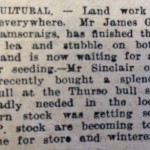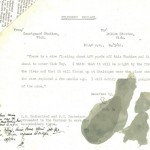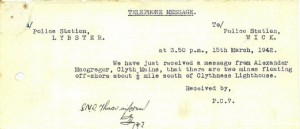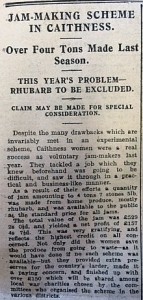Last week the British had evacuated Rangoon; this week Japanese troops moved in. Since declaring war in December Japan had gained control of Java, Burma and New Guinea and now began to land troops in Mindanao in the Philippines as well as the Solomon Islands, directly threatening Australia. Meanwhile in Europe the RAF continued to bomb German cities, attacking Essen on 13 March; and on 11 March the French Resistance blew up a German troop train, killing some 250 soldiers.
In Caithness, farmers were getting ready for the new season. As the John O’Groat Journal reported in Dunbeath, “Land work is going ahead everywhere. Mr James G. Sutherland, Ramscraigs, has finished the ploughing of lea and stubble on both of his farms, and is now waiting for a suitable day for seeding.”
 Mines were still a constant threat to the county’s coasts. On 14 March Wick Coastguard reported, “There is a mine floating about 400 yards off this Station and it is about to enter Wick Bay. I think that it will be caught by the flow of the river and that it will finish up at Shaltigoe near the place where the mine exploded a few months ago.” The police warned the householders near the harbour. A note in the margin reads: “The mine came ashore near the North Head Bathing Pool at 12.10pm.”
Mines were still a constant threat to the county’s coasts. On 14 March Wick Coastguard reported, “There is a mine floating about 400 yards off this Station and it is about to enter Wick Bay. I think that it will be caught by the flow of the river and that it will finish up at Shaltigoe near the place where the mine exploded a few months ago.” The police warned the householders near the harbour. A note in the margin reads: “The mine came ashore near the North Head Bathing Pool at 12.10pm.”
Next day the Lybster police reported: “We have just received a message from Alexander  Macgregor, Clyth Mains, that there are two mines floating off-shore about half mile south of Clythness Lighthouse”.
Macgregor, Clyth Mains, that there are two mines floating off-shore about half mile south of Clythness Lighthouse”.
 There was mixed news regarding the county’s jam scheme this week. During the previous year voluntary jam-makers in Caithness had made over four tons of jam from home produce. As the John O’Groat Journal noted, “Not only did the women save the produce from going to waste … but they provided extra preserves for the country’s larder, made it a paying concern and finished up with over £150 which will be shared among local war charities.” But most of the jam had been made from rhubarb, and next year rhubarb was to be excluded from the scheme; as Caithness was not a fruit-producing county, officials were considering an appeal.
There was mixed news regarding the county’s jam scheme this week. During the previous year voluntary jam-makers in Caithness had made over four tons of jam from home produce. As the John O’Groat Journal noted, “Not only did the women save the produce from going to waste … but they provided extra preserves for the country’s larder, made it a paying concern and finished up with over £150 which will be shared among local war charities.” But most of the jam had been made from rhubarb, and next year rhubarb was to be excluded from the scheme; as Caithness was not a fruit-producing county, officials were considering an appeal.
Finally this week, the John O’Groat Journal reported that the Spitfire “Caithness”, which had  been paid for by funds raised in the county, had been in action recently over the Channel. The plane had become separated from its squadron: “A few moments later the pilot saw two ME109’s ready to dive on him. He climbed towards them, and one of the Messerschmitts flew right through a burst of cannon and machine-gun fire from “Caithness”. The enemy aircraft went down in a steep dive and was seen to crash into the sea. Having seen what happened to his companion, the pilot of the second ME flew home and “Caithness” landed unscathed.”
been paid for by funds raised in the county, had been in action recently over the Channel. The plane had become separated from its squadron: “A few moments later the pilot saw two ME109’s ready to dive on him. He climbed towards them, and one of the Messerschmitts flew right through a burst of cannon and machine-gun fire from “Caithness”. The enemy aircraft went down in a steep dive and was seen to crash into the sea. Having seen what happened to his companion, the pilot of the second ME flew home and “Caithness” landed unscathed.”
